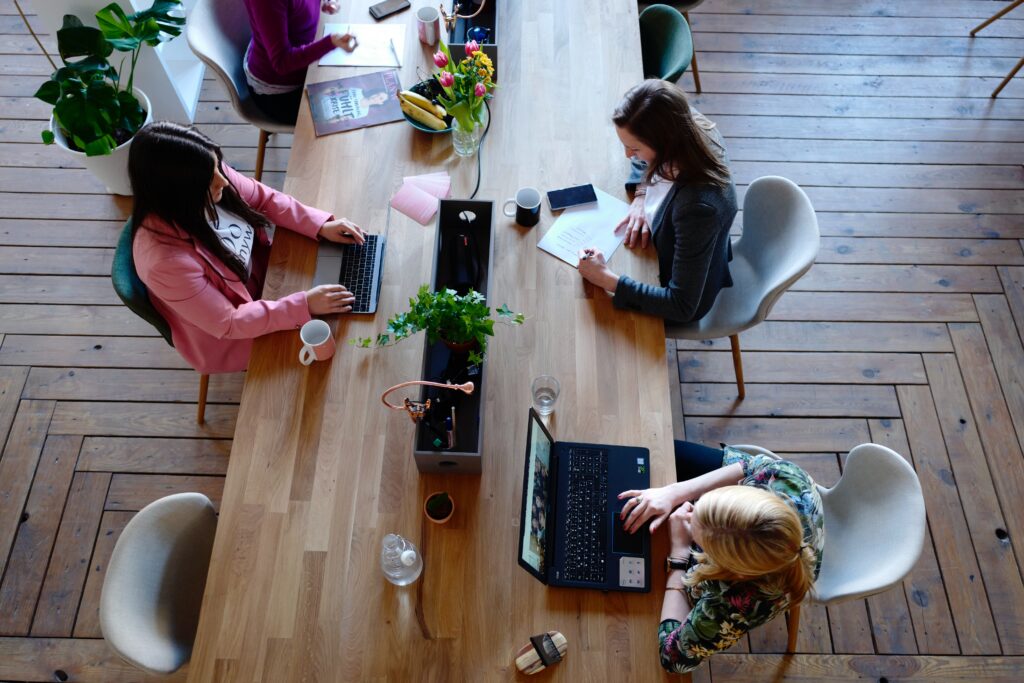An interesting statistic that we recently shared in our Friday FeMail newsletter indicated that 72% of workers believe work-life balance is a very important factor when choosing a job. But to be honest, the term “work-life balance” has changed dramatically since the onset of COVID-19. There are people who have found a way to reach and maintain a good work-life balance, some have decided to combine the two and become digital nomads (we discuss this more below), but then there are also people who have lost their touch when it comes to finding (and keeping) that balance. For many, working from home means being available 24/7. But how exactly did that happen? And how do we re-shift this to a healthier balance?
In the past, working from home was something only a few privileged people had the pleasure of experiencing, and it was something that rarely (if ever) took place in most workplaces. But with hard lockdowns being implemented worldwide in 2020, there was no other choice but to work from home. Fast forward to two years later and the whole idea of the workplace has changed completely. Terms like digital nomading, hybrid working, and permanently working from home have become part of our everyday lives. When applying for a job today, many people will only consider a position if it promises remote or at least hybrid working. The idea that workers (employees and employers) have to sit in an office from 9am to 5pm every day has long gone. Big companies such as Google and Pinterest have a hybrid, with a fully remote option working policy. Companies and business owners have adapted very quickly, and those who haven’t aren’t being loved by their employees. Today, a Zoom meeting can include colleagues from Amsterdam, Cape Town, Berlin, Nairobi, Brazil, you name it – all at the same time. It’s exciting and opens the door to new possibilities. For example, countries like Belgium, Scotland, Spain, and Iceland have adopted a four-day workweek (although most are still in a trial period). So, what does the new workplace actually look like?
ALSO SEE: The Future of Digital Storytelling
Let’s first dive a little deeper into what these various new “workplace” terms actually mean.
Digital nomading
Want to travel the world, while working? Well, that’s exactly what digital nomading is. As a digital nomad, you are location independent and you work online – those are the terms. Many people who have adopted this lifestyle have sensed freedom in a way few others ever will. An anonymous quote that describes traveling probably the best is “traveling is the only thing you buy that makes you richer.” Digital nomading is for those who are true adventurers at heart.
Hybrid working
Hybrid working is a flexible work model which allows employees to split working from home (remote) and in the office. The working arrangements differ from company to company, but ultimately employees can choose when to work from home, or another remote location, and when to work in a hybrid working environment. This hybrid working space is also a new buzzword in business. Many office spaces are now hybrid spaces, inviting different companies to share the same workspace.
Fully remote working
Similar to digital nomading, fully remote working means you can work from anywhere. It refers to any position where you either don’t have to work from your company’s office, or the company doesn’t have a permanent office space, and the entire team works from anywhere in the world. The flexibility to travel to other places while still being online is one of the main things that makes this type of working arrangement so desirable.
ALSO SEE: 5 Communication Trends You Need To Know About
Meaning and purpose in the new workplace
What do meaning and purpose in the new workplace mean, and why is it more important than ever?
As we’ve seen above, although work-life balance has changed, it is perhaps more important than ever. COVID-19 has changed the way we view the world, it has changed the way we look at each other, and it definitely made us reevaluate our lives and what we deem important. If we haven’t noticed it before, the pandemic has made us aware that without our health, we don’t have anything. One of the biggest lessons we have learned is, that if you want to do something, don’t wait for “one day”, do it now. We get so excited when we hear how many women have decided to take a leap of faith and start their own businesses. Female entrepreneurs are rising and the confidence that’s coming with it is truly inspiring.
ALSO SEE: What Would You Tell Your Younger Self?
Finding meaning and purpose in the workplace means different things to different people. Not everyone has the same dream. Not everyone has a dream of becoming an entrepreneur. Some people want to have freedom in terms of digital nomading, some people want to be a part of the creator economy. But we can all agree that feeling like you’re making a difference, that your contribution to a company (whether it be your own or someone else’s) really has meaning. If you feel encouraged to showcase your strengths and values, the chances of you either staying at a company or expanding your own business are much bigger.
Employers can ensure meaning in purpose in the workplace in different ways. Apart from encouraging a work-life balance, ensuring personal growth, career development, conscious leadership, wellness, emotional intelligence (EQ), and cultural respect are some of the ways in which a holistic environment can be reached.
ALSO SEE: What Is the Creator Economy and How Is It Shaping Content in 2022?

